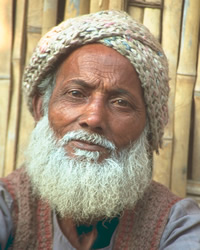The Bengali are considered to be the original inhabitants of the Bengal region of southwest Asia. This territory is divided politically between Bangladesh and West Bengal, a state in India. Bengali is the native language spoken by most of the groups in this region. Most of the Bengali diaspora are from Bangladesh, and they are commonly called Bangladeshis.
Although the Bengalis are primarily classified according to language, their culture remains very diversified. In general, the Bengalis are a proud people, highly ambitious, and always striving for excellence. Although outside influences are being incorporated into their culture, the Bengalis remain very proud of their cultural heritage. They are noted in South Asia for their literature.
While the vast majority of Bengalis live in Bangladesh and northeast India, there are significant communities in a number of other countries and other parts of India as well. There are Bengali diaspora communities in Oman, the UAE, Saudi Arabia, Kenya, Myanmar, Singapore, and Japan.
Bangladeshis are among the smaller migrant groups in Japan. Their history in Japan only goes back to 1985. At that time, they were allowed to obtain student visas and work part time. They would try to find more work, establish their roots in Japan, and stay there for longer periods of time. Three years later the Japanese government began to clamp down on this, and the number of migrant workers from Bangladesh and other countries dropped. Soon people smugglers managed to get some of them back in.
Japan is a favored destination for Bangladeshi migrants because wages are relatively high. The Bangladeshis who migrate to Japan are usually better educated than other migrants. Most are young and male, often recent college graduates who find jobs hard to come by in Bangladesh. In Japan take the dirty, dangerous, and demeaning jobs and save their money. After working for an average of seven years they return to Bangladesh where they often either use their money to buy land or begin new businesses. Most of the Bangladeshis in Japan are from Munshiganj District, south of Dhaka.
Most Bengali people in Myanmar are Sunni Muslims who believe that the One, Supreme God, Allah, spoke through his prophet, Mohammed, and taught mankind how to live a righteous life through the Koran and the Hadith. To live a righteous life, you must utter the Shahada (a statement of faith), pray five times a day facing Mecca, fast from sunup to sundown during the month of Ramadan, give alms to the poor, and make a pilgrimage to Mecca if you have the means. Muslims are prohibited from drinking alcohol, eating pork, gambling, stealing, slandering, and making idols. They gather for corporate prayer on Friday afternoons at a mosque, their place of worship.
In most of the Muslim world, people depend on the spirit world for their daily needs since they regard Allah as too distant. Allah may determine their eternal salvation, but the spirits determine how well we live in our daily lives. For that reason, they must appease the spirits. The often use charms and amulets to help them navigate these spiritual forces.
The Hindus among the Bengalis in Japan focus on the gods and goddesses of Hinduism. They have a pragmatic approach to spiritual matters, worshipping the deities they believe will help them in practical ways.
Bangladeshis in Japan need to hear that Jesus Christ offers them life to the full.
Pray for the physical and spiritual needs of the Bengalis to be met in Japan.
Pray for the Holy Spirit to move among Bengali-speaking communities all over the world so that they will hunger for truth and righteousness.
Pray for Bengali Muslims in Japan to have the chance to hear and respond to Jesus Christ.
Pray for a Disciple Making Movement among Bengalis in Japan.
Scripture Prayers for the South Asian, Bengali-speaking in Japan.
| Profile Source: Joshua Project |












